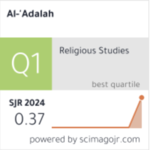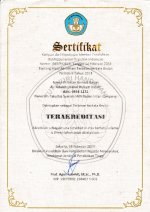'Iddah in the View of Islam and Feminists
Abstract
This study examines Islamic concepts of 'Iddah (waiting period for a divorced wife) and how the Feminists view it. The aim is to comprehend the different perspectives and try to put the problem in the right position. This research is purely library research using a socio-philosophical approach. Data were obtained from literature, books, and available documents. Based on the results of the study, it can be concluded that in Islamic teachings 'iddah is intended to determine the status of the womb, whether pregnant or not, to avoid mixing the lineage of the expecting baby. This is different from the view of the feminists who think that the provision regarding 'iddah is a product of a patriarchal culture that marginalizes women as it only applies to women, and not to men. This feminist view is based on the spirit of equality before the law which demands equal rights and obligations. The view, however, needs to be reviewed as the provision of 'iddah does not necessarily mean ignoring the principle of equality between men and women. Men and women by nature are created with different physical and emotional characters according to their respective roles. Even if such a view is applied, new problems will arise and damage the order of human culture universally
Keywords
Full Text:
PDFReferences
Abu Rokhmat and Sulistiono Susilo, ‘Conceptualizing Authority of the Legalization of Indonesian Women’s Rights in Islamic Family Law’, Journal of Indonesian Islam, Volume 11 Number 02 (2017), 489.
Abu Zahrah, Muhammad, Uṣūl al-Fiqh. Beirut: Dār al-Fikr al-Arabi, 2007.
Akbar, Cholis, ‘Kerancuan Metodologi Draft Kompilasi Hukum Islam’ http:/ www.hidayatullah.com [accessed 14 February 2021].
Ābidin, Muhammad Amin bin Umar bin Abdul Aziz Ibnu al-, Radd al-Mukhtar Ala al-Durar al-Mukhtar Fī Syarh Tanwir al-Absār: Hāsyiah Ibnu Abidin. Beirut: Dār Al-Fikr, 2012.
Dahlawiy, Syah Waliyullah al-, Hujjah Allah al-Bālighah. Beirut: Dār Ihya al-’Ulum, 2002.
Department of Economic and Social Affairs, ‘THE 17 GOALS’ https://sdgs.un.org/goals [accessed 17 February 2021].
Engineer, Asghar Ali, Hak-Hak Perempuan dalam Islam, Terjemahan Farid Wajidi dan Cici Farcha Assegaf. Yogyakarta: LSPPA, 2007.
Evelyn Ochi, ‘Mengenal Dehumanisasi, Kemampuan Tidak Memanusiakan Manusia yang Perlu Diwaspadai’, 2018
https://journal.sociolla.com/lifestyle/mengenal-dehumanisasi/ [accessed 16 February 2021].
Hāsyimiy, Ahmad al-, Jawāhir al-Balāghah Fī al-Ma’ānī Wa al-Bayān Wa al-Badī’. Damaskus: Maktabah Dār al-Ihyā’ al-Kutub al-Arabiyah, 2011.
Henderi Kusmidi, ‘Reaktualisasi Konsep Iddah dalam Pernikahan’, Jurnal Ilmih Mizani: Wacana Hukum, Ekonomi dan Keagamaan, Vol 4. No. 1 (2017).
Islāmiyah al-, Wazarat al-Awqāf Wa al-Syuūn, al-Mausū’ah al-Fīqhiyah. Kuwait: Matabi’ Dār al-Ṣafwah Li al-Nasyr Wa al-Tauzī’, 2003.
Indonesia, Wikipedia bahasa, ‘Feminisme’ https://id.wikipedia.org/wiki/Feminisme [accessed 17 February 2021]
———, ‘Misogini’ https://id.wikipedia.org/wiki/Misogini [accessed 14 February 2021]
Jāziri, Abdurrahman al-, al-Fīqh ‘Alā al-Mażāhib al-Arba’ah. Kairo: Dār al-Hadis, 2004.
Khairi, Nispul, ‘Pemikiran Hukum Islam Tentang Hukum Perkawinan: Analisis CLD KHI-KHI Inpres No 1/1991’, Jurnal Consilium Fakultas Dakwah dan Komunikasi IAIN Sumatra Utara, Volum 1 Nomor 1 (2014).
Khallaf, Abdul Wahhab, Ilmu Usul al-Fiqh. Kairo: Dār al-Qalam, 2008.
Kholil, Muhammad, ‘Pelaksanaan Kewajiban Suami Terhadap Istri dalam Masa Iddah Menurut Hukum Islam di Desa Batu Bintang Kec. Batu Mar-Mar Kab. Pamekasan’, Jurnal Al- Ulum: Jurnal Pemikiran dan Penelitian Ke-Islaman, Vol. 5 No. 2 (2018)
https://doi.org/https://doi.org/10.31102/alulum.5.2.2018.66-75.
Kharsi al-, Syarh al-Kharsi ‘Ala Mukhtasar al-Khalil al-Kharsi. Beirut: Dār al-Kutub al-'Alamiyah, 2005.
Kuntowijoyo, ‘Pengertian Humanisasi Liberasidan’ http://hardikadwihermawan. blogspot.com/2011/07/pengertian-humanisasi-liberasidan. [accessed 12 February 2021].
Lehmann, Imani Jaafar-Mohammad and Charlie, ‘Women ’s Rights in Islam Regarding Marriage and Divorce’, Journal of Law and Practice’s William Mitchell, Vol 4 Article 3 (2011), 8.
Mertokusumo, Sudikno, Mengenal Hukum: Suatu Pengantar. Yogyakarta: Liberty, 2007.
Muhammad bin Idris al-Syāfi’i, al-Umm. Beirut: Dār Al-Fikr, 2003.
Munawwi, M. Fajrul, ‘Relevansi Pemikiran Sayyid Quṭub Tentang Tafsir Jahiliyah bagi Dakwah dan Pengembangan Masyarakat Islam Kontemporer’, Jurnal Dakwah Media Komunikasi dan Dakwah, 11.1 (2011), 73.
Mustara Razali, ‘Analysis of Islamic Legal Rulings Relating to Women Activites during Waiting Period (Iddah) of Revocable Divorce (Talaq Raj’ie) According to Muslim Jurists’, Jurnal Islam dan Masyarakat Kontemporari Universiti Sultan Zainal Abidin, 2020, 280–81
https://doi.org/https://doi.org/10.37231/ jimk.2020.21.1.478.
Nuansa, Tim Redaksi, Kompilasi Hukum Islam (Dilengkapi Dengan UU No. 1 Tahun 1975 Tentang Perkawinan, UU No. 41 Tahun 2004 Tentang Wakaf, UU No. 23 Tahun 2011 Tentang Pengelolaan Zakat dan Fatwa-Fatwa MUI). Bandung: Nuansa Aulia, 2012.
Nujaim, Muhammad bin Husain bin Ali al-Turi al-Hanafī bin al-, al-Bahr al-Raīq Syarh Kanz al-Raqāiq. Beirut: Dār al-Ma’rifah, 2007.
Qurthubi al-, al-Jāmi’ Li Ahkām al-Qur`ān. Beirut: Dār al-Fikr, 2003.
Romli, Dewani, & Zaelani, Abdul Qodir, ‘Counter Legal Drafting of the Islamic Law Compilation, A Gender Perspective’, Advances in Social Science, Education and Humanities Research, Volume 49 (2019), p. 331-337.
Salih, Muhammad Adib, Tafsīr al-Nuṣūṣ Fī al-Fiqh al-Islāmi. Beirut: al-Maktab al-Islāmi, 2009.
Ṣāwi, Ahmad bin Muhammad al-, al-Syarh al-Ṣaghīr ‘Alā Aqrab al-Masālik Ila Mazhab Imam Malik Ma’a Hāsyiah al-Ṣāwi. Beirut: Dār al-Ma’ārif, 2003.
Sayis, Muhammad Ali, Tafsīr al-Āyāt al-Ahkām. Beirut: Dār al-Fikr, 2010.
Suyūṭi, Jalāluddin Abd al-Rahmān bin Abi Bakar al-, Lubāb al-Nuqūl Fī Asbāb al-Nuzūl. Riyadh: Maktabah Al-Riyadh Al-Hadisah, 2012.
Syalṭut, Mahmud, al-Islām Aqīdah Wa Syarī’ah. Beirut: Dār al-Qalam, 1996.
Syarbini al-, Mughni al-Muhtāj. Kairo: Dār al-Kurub al-Misriyah, 2001.
Syarbini, Syamsuddin Muhammad bin al-Khatīb al-, Mughni al-Muhtāj, Tahqīq: Muhammad Khalil Aitani. Beirut: Dār al-Ma’rifah, 1418.
Syātibī, Imam al-, al-Muwāfaqāt Fī Uṣūl al-Ahkām. Beirut: Dār al-Fikr, 2007.
Ṭālib, Safī Hasan Abū, Taṭbīq al-Syarī’ah al-Islāmiyah Fī al-Bilād al-‘Arabiyah. Kairo: Dār al Nahḍah al-Arabiyah, 1990.
Wahid, Marzuki, Pembaman Hukum Keluarga Islam Pasca Orde Baru dalam Pendekatan Fiqih Studi Kasus CLD-KHI dalam Generasi Baru Peneliti Muslim di Indonesia Kajian Islam dalam Ragam Pendekatan Program PIES 2008-2009. Purwokorto: Australia - Indonesia Institut, 2010.
Yulia, Hukum Perdata. Lhokseumawe: CV. BieNa Edukasi, 2015.
Zuhaili, Wahbah al-, al-Fiqh al-Islāmī Wa Adillatuhu. Beirut: Dār al-Fikr, 2007.
DOI: http://dx.doi.org/10.24042/adalah.v18i2.8515
Refbacks
- There are currently no refbacks.
Copyright (c) 2022 AL-'ADALAH
Al-'Adalah is licensed under a Creative Commons Attribution-ShareAlike 4.0 International License.




.png)
_(1).png)
_(1).png)

.png)
